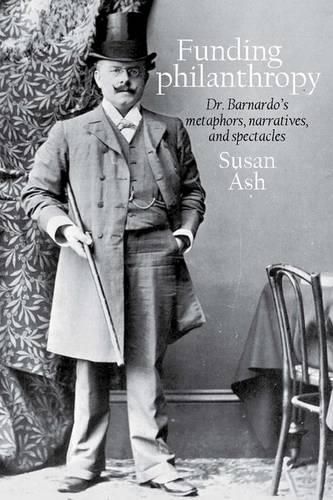Readings Newsletter
Become a Readings Member to make your shopping experience even easier.
Sign in or sign up for free!
You’re not far away from qualifying for FREE standard shipping within Australia
You’ve qualified for FREE standard shipping within Australia
The cart is loading…






Funding Philanthropy investigates Dr Barnardo’s work and philanthropic ‘empire’ as early manifestations of promotional and branding mechanisms in the mid- to late-Victorian period, processes that would seem commonplace by the mid- to late-twentieth century. Barnardo possessed a strategic sense of what would excite people’s interest and pity, as well as a seemingly unfailing capacity to package and promote evangelical philanthropy on behalf of children, the nation and the Empire. Thus, the book explores Barnardo as creative promoter and ‘showman,’ a savvy entrepreneur in an evangelical context that overtly mandated against privileging business principles generally, and the practice of direct appeal specifically. To manage the business of philanthropy, Barnardo operated as narrator, orchestrator, and showman, depending upon artfully constructed bodies, images and stories as imperatives for emotional engagement and collective participation. Funding Philanthropy offers new knowledge to anyone interested in Victorian history, conceptualising children, literary modes, and marketing practices. The book also considers how Barnardo’s conception of charity is closely aligned with principles of unconditional hospitality, precisely at a moment in time when the English were intent on centralising philanthropy and on meting out support according to measures Barnardo regarded as punitive and unchristian. Part One explicates how institutional branding evolved according to the properties associated with the metaphor of the ‘open door’; Part Two elucidates how narrative devices associated with fiction raise both affect and funds; Part Three concentrates on how Barnardo exploited strategies associated with dramatic performance in public spectacles, despite his adamant strictures against the theatre itself. Discussion burrows down to elucidate such events as highly ritualised Annual General Meetings, child picnics, as well as ubiquitous ‘bazaars’ and self-denial drives. Extensive research in Barnardo’s vast archive of periodical publication for children, youth and adults and the wider public press underpin the discursive analysis.
$9.00 standard shipping within Australia
FREE standard shipping within Australia for orders over $100.00
Express & International shipping calculated at checkout
Funding Philanthropy investigates Dr Barnardo’s work and philanthropic ‘empire’ as early manifestations of promotional and branding mechanisms in the mid- to late-Victorian period, processes that would seem commonplace by the mid- to late-twentieth century. Barnardo possessed a strategic sense of what would excite people’s interest and pity, as well as a seemingly unfailing capacity to package and promote evangelical philanthropy on behalf of children, the nation and the Empire. Thus, the book explores Barnardo as creative promoter and ‘showman,’ a savvy entrepreneur in an evangelical context that overtly mandated against privileging business principles generally, and the practice of direct appeal specifically. To manage the business of philanthropy, Barnardo operated as narrator, orchestrator, and showman, depending upon artfully constructed bodies, images and stories as imperatives for emotional engagement and collective participation. Funding Philanthropy offers new knowledge to anyone interested in Victorian history, conceptualising children, literary modes, and marketing practices. The book also considers how Barnardo’s conception of charity is closely aligned with principles of unconditional hospitality, precisely at a moment in time when the English were intent on centralising philanthropy and on meting out support according to measures Barnardo regarded as punitive and unchristian. Part One explicates how institutional branding evolved according to the properties associated with the metaphor of the ‘open door’; Part Two elucidates how narrative devices associated with fiction raise both affect and funds; Part Three concentrates on how Barnardo exploited strategies associated with dramatic performance in public spectacles, despite his adamant strictures against the theatre itself. Discussion burrows down to elucidate such events as highly ritualised Annual General Meetings, child picnics, as well as ubiquitous ‘bazaars’ and self-denial drives. Extensive research in Barnardo’s vast archive of periodical publication for children, youth and adults and the wider public press underpin the discursive analysis.